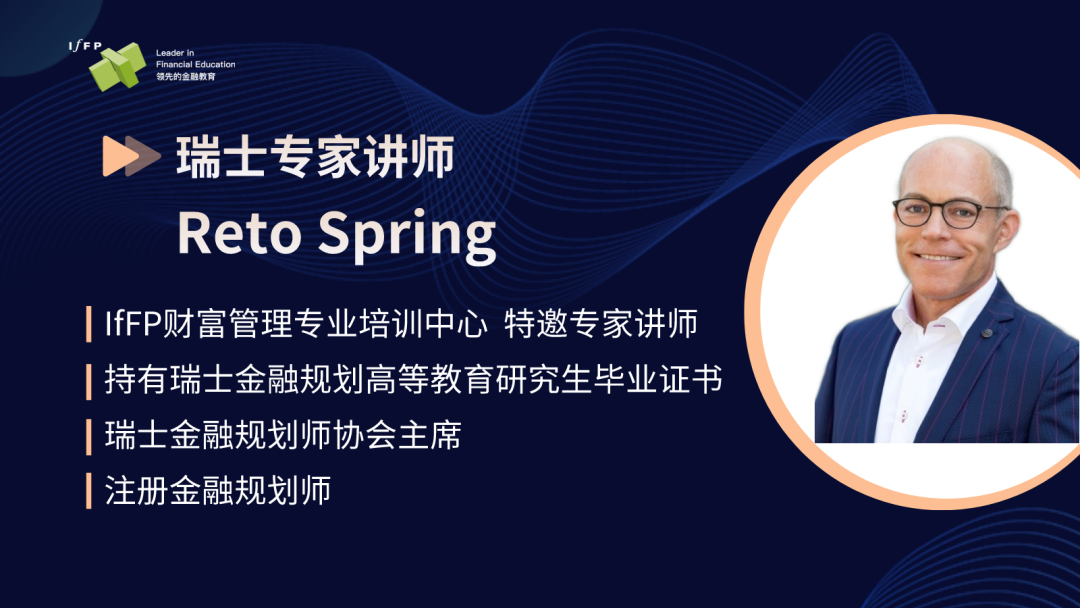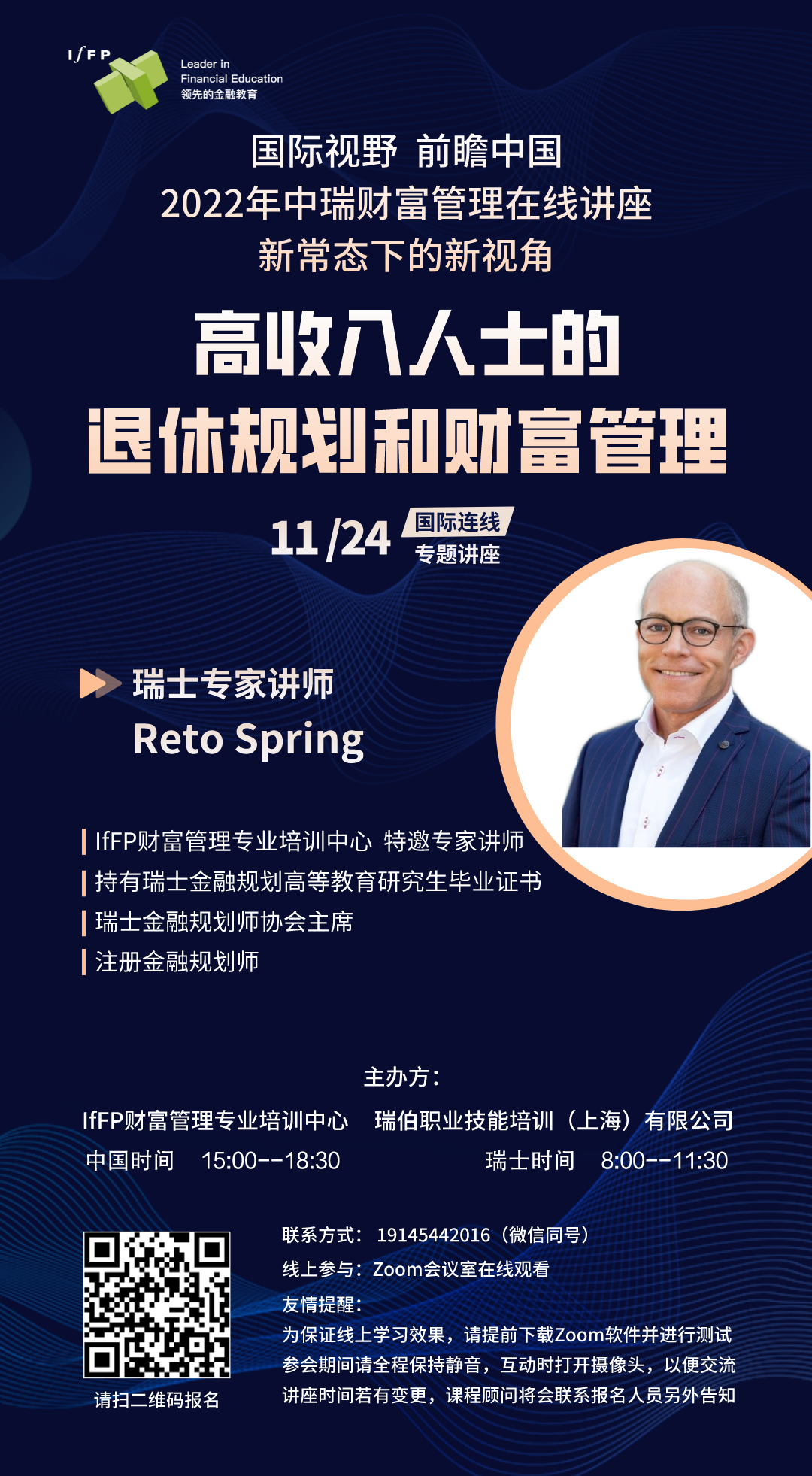随着延长退休年龄已成趋势、金税四期正式启动,越来越多人关注养老规划话题,而高净值人群对这些话题更是关注。金钱就是时间,如何用金钱换回时间,我们可以以钱为策,换取空闲时间、灵活退休和个人生活;要达到上述目标,需要理解财富管理其实也是人生的规划这个理念。那么高收入人士如何应对去全球化、货币危机、主权债务和通货膨胀等挑战?有两个大的维度需要关注:
➤ 企业、财富维度:个人退休规划及企业家族传承;
➤ 个人维度:养老问题(财富安排)及精神生活(心理健康);
瑞士作为全球金融中心,在财富管理领域有着近两百年的经验,他们是如此应对、规划人人都要面对的这些养老话题,包括提前退休、国际居住地变更、资产保护和资产的世代传承等?

2022年11月24日(周四)下午,IfFP财富管理专业培训中心邀请了瑞士财务规划师协会主席Reto Spring为大家带来【高收入人士的退休规划和财富管理】,Reto Spring老师拥有瑞士财务规划高等教育研究生文凭(财务规划专家)和注册财务规划师(CFP)执照。他曾在一家大型金融服务公司担任了14年的财务规划师和高管,自2017年以来一直为医生和企业家提供独立的收费咨询服务,主要以退休规划为重点。他已担任了十多年的瑞士财务规划师协会主席,2022年,他与其他人合著了一本财务规划书籍《方向而非货币量》(Orientation instead of Reto Spring),同时也是IfFP财富管理专业培训中心的常驻讲师和专栏作家。
想了解讲座当天有哪些干货不容错过,Reto Spring老师已经为大家做好关于退休规划的预习要点,来看老师的精彩分享吧。

以下为Reto Spring老师的本次分享全文
普通收入者认为,对于那些即将退休的高收入人士来说,远离活跃的工作生活,将会给她们带来很多“奢侈”问题:通常,这群人有不错的收入和价值不菲的资产,这些资产远远超过退休后维持他们奢侈消费的生活水平需求。然而他们不了解的是,拥有的资产超过自身消费能力同样会带来责任、义务、任务和风险。对于一辈子兢兢业业,成功建立和经营着企业的高净值人士而言,简单地将自己终生成就的事业交托他人之手是件难事。而乐观的看,进入人生新阶段,再度处理新课题可能也是一种解放。
乍一看,退休规划包括纯粹的技术层面:财务规划、税务规划、遗产规划等,但还涉及到心理层面:客户个人是否做好了退休的准备?
从工作生活向退休生活的过渡常常伴随着着对失去身份、控制权、影响力甚至生命意义及存在理由的恐惧。这种心理因素引发了个人的矛盾情绪,导致看似“完美”的退休计划一再推迟,或只能延后,或分段落实退休计划。在企业继任规划中,决定成败的八成是人为因素。因此,高收入人士的退休规划必须充分考虑到各项决策之间的平衡。
所以,与其从技术层面思考“必须做什么?”,不如首先考虑这个问题:“为什么金钱对我很重要?金钱如何定义我本人和我的生活?金钱如何对我的生活产生积极影响?我的财富如何提高我的生活质量?”
显而易见,没钱会让人不快乐,影响预期寿命。反过来看,“财富悖论”认为金钱的边际效用越来越小,甚至为负:高收入会使生活满意度下降,让人孤独抑郁,正所谓“豪宅越大,围墙越高”。

按照“时间就是金钱”的格言,终其一生,人们就像在轮上狂奔不停的仓鼠。某种程度上人们会有这样的认知:富有总是相对的,而一个人的时间是有限的,人死之后什么都带不走。因此,问题是如何用金钱“换回”时间。
我们在本次研讨会中探讨多方面的内容,包括提前退休、国际居住地变更、资产保护和资产的世代传承。高收入人士如何应对去全球化、货币危机、主权债务和通货膨胀等挑战?瑞士作为一个没有大宗商品的小国,却管理着全球的四分之一规模的海外资产,组织几乎全球一半的黄金、石油或咖啡等大宗商品贸易……通过瑞士财富管理可以学到哪些资产保护秘诀?
拥有财富,才能成事。正因如此,我们也致力于研究如何利用财富来最大限度地提高生活质量。金钱就是时间,我们可以以钱为策,换取空闲时间、灵活退休和个人生活。财务规划只有付诸实施才有用。因此,作为演讲者我会更注重退休规划的简洁性、透明性、清晰性和可控性。结合每个人的价值观、态度和经验考虑,因为你才是自己生活的最好专家。
以下为Reto Spring老师的原稿
High earners who are heading towards retirement from active work life have luxury problems from the point of view of average earners: As a rule, they have more income and assets than they need to maintain their standard of living beyond retirement. However, having more assets than you can consume yourself also brings with it responsibilities, obligations, tasks and risks. Anyone who has spent a lifetime successfully building up and running a company may find it difficult to simply hand over the fate of his or her life's work to other hands. Positively viewed, it can be liberating to turn to a new phase of life and once again tackle new projects.
At first sight, retirement planning comprises the purely technical aspects: financial planning, tax planning, estate planning, etc. However, there is another, psychological side: Is a client ready for retirement from his or her personal perspective?
The transition from working life to retirement is often associated with fears of losing identity, control, influence, and even the meaning of life and its raison d'être. This psychological component leads to ambivalence, so that seemingly "perfect" retirement plans are postponed or implemented only with delay or piecewise. In corporate succession planning, it is 80% human factors that determine success or failure. Therefore, sufficient consideration must be given to the balance of decisions in the retirement planning of high earners.
So instead of starting with the technical questions "What has to be done?", the first questions are "Why is money important to me? How does it define me, my life? How can it have a positive impact on my life? How can my wealth add to my quality of life?“
Obviously, having no money makes people unhappy and impairs life expectancy. Conversely, there is the "wealth paradox" that money has a decreasing or even negative marginal utility: High wealth can make life satisfaction fall and lead to loneliness and depression: "The bigger the mansion, the higher the fence“.
A lifetime spent running on the hamster wheel according to the motto "time is money". At some point, the cognition arises: prosperity is always relative, one's own time is limited and the last shirt has no pockets. Thus, the question arises how money can be transformed back into time.
In this seminar we address aspects such as early retirement, international change of residence, asset protection of assets and their transfer to future generations. As a high earner, how can I respond to challenges such as de-globalization, currency crises, sovereign debt and inflation? Switzerland is a small country with no commodities, but manages a quarter of the world's offshore assets and organizes half of the commodity trade such as gold, oil or coffee...What can you learn from Swiss wealth management to protect your assets?
Wealth is the ability to do something. That's why we also devote ourselves to the aspect of how you can use wealth to maximize your own quality of life. Money is time and enables strategies for time off, flexible retirement and life as a private individual. Financial planning is only useful if it is put into practice. Therefore, the speaker emphasizes simplicity, transparency, clarity, and controllability. Combined with your own values, attitudes, and experiences - because you are the best expert for your own life.
About Reto Spring
Reto Spring holds a Swiss Postgraduate Diploma of Higher Education in Financial Planning (Financial Planning Expert) and a Certified Financial Planner (CFP) license.
Reto worked as a financial planner and executive for a large financial services provider for 14 years and has been working as an independent fee-based advisor for physicians and entrepreneurs with a focus on retirement planning since 2017.
He is Chairman of the Swiss Financial Planners Association for more than ten years, lectures at Swiss educational institutions relevant to financial planning and publishes regularly. In 2022, he co-authored a financial planning book titled "Orientation instead of Moneypulation".
Reto Spring is also a regular lecturer and columnist for the IfFP Swiss Wealth Management Professional Training Center.

- End -
国际 | 财富 | 教育
源自瑞士,扎根中国
努力成为中国财富管理专业教育和培训的领导品牌
选择比努力更重要
共同学习终身成长
欢迎您加入财富管理专业培训中心
